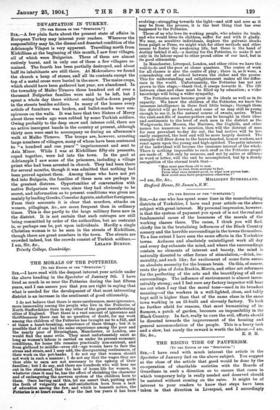[To THE EDITOR OF THE " SHICTATOR."
SIR,—As one who has spent some time in the manufacturing districts of Yorkshire, I have read your article on the above subject with great interest. My personal impression, however, is that the system of payment you speak of is not the real and fundamental cause of the looseness of the morals of the working classes there. The cause, I think you will find, chiefly lies in the brutalising influences of the Black Country scenery and the horrible surroundings in the towns themselves. To a less extent I have seen the same effects in the Yorkshire towns. Arduous and absolutely unintelligent work all day and every day exhausts the mind, and where the surroundings contain no elements of interest and beauty, the mind is naturally directed to other forms of stimulation,—drink, im- morality, and such like ; for excitement of some form seems an absolute necessity for the human brain. On this, of course, rests the plea of John Ruskin, Morris, and other art reformers for the perfecting of the arts and the beautifying of all our surroundings. The influence of environment is almost incon. ceivably strong; and I feel sure any factory inspector will bear me out when I say that the moral tone—used in its broadest meaning—of the workers in a well-lighted, clean, and tidily kept mill is higher than that of the same class in the same town working in an ill-built and slovenly factory. To look no further afield for reasons, that most humanising of in- fluences, a patch of garden, becomes an impossibility in the Black Country. In fact, really to cure the evil, efforts should be directed towards the improvement of the housing and general accommodation of the people. This is a heavy task and a slow, but surely the reward is worth the labour.-1 am,










































 Previous page
Previous page